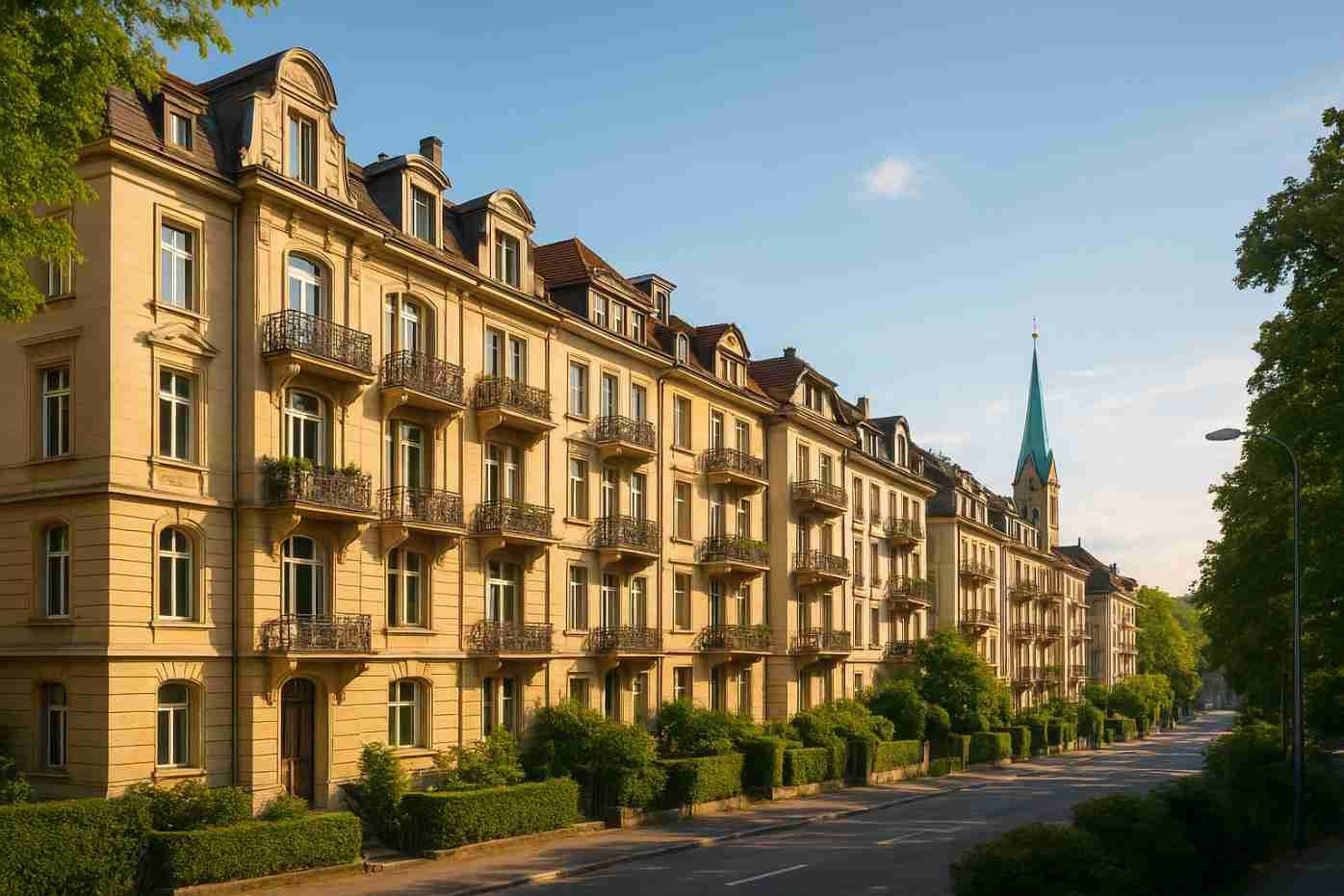I still remember how hard it was when I first came to Switzerland to find accommodation. I spent my landing day eager and full of dreams, but I was also soon going to be disappointed, saying that finding a roof over my head wasn’t going to be as easy as I had anticipated. From the never-ending online listings to rejections popping into my inbox faster than I could apply, the Swiss housing market was a riddle I needed to solve.
At the beginning, I underestimated the process. I reasoned, How difficult can renting in Switzerland be? But I soon found out that high demand, strict requirements and super-speedy offers meant I had to be smart, be ready and be patient. It wasn’t just about money! It was all about timing and documents and sometimes luck.
That’s exactly why I built this guide: So that you don’t have to waste hundreds of stressful hours like I did. Here, I’ll point out what works, what doesn’t, the pros and cons of different types of housing, and my personal recommendations for students, expats, and families.
Whether you’re after a flatshare in Zurich, student accommodation in Lausanne or a family home in the vicinity of Bern, this guide takes you through everything you’ll need to consider and all the steps you’ll need to take. Why? Because all I want is for your journey to be smooth, fast and a hell of a lot less of a pain in the ass than mine.
 Why Finding Housing is Hard in Switzerland
Why Finding Housing is Hard in Switzerland
If you’ve ever gone apartment hunting in Switzerland, then you probably know it’s like applying for a competitive job. When I began app and web hunting for an apartment, it surprised me how quickly I saw listings (sometimes within hours) disappear. By the time I got my paperwork together, the apartment was taken. That’s when it hit me: The Swiss housing market is one of the most competitive housing markets in Europe.
This is for a few reasons. First, high demand is outstripping available supply, particularly in large cities: Zurich, Geneva and Lausanne. Thousands of students, professionals and expats come each year! However, the supply of apartments does not keep pace. Second, Swiss landlords are extremely picky. They’re not looking just at people who can pay the rent; they’re looking for stable, reliable people and who also have a clean financial record. That can be intimidating to newcomers.
I actually did this when I applied for my first studio apartment. I provided all the documents and even a nice handwritten introduction letter, and I was willing to pay a few months’ rent upfront. But still, I got rejectedjust because there were 40 other candidates. It was disappointing, but it taught me a lesson: in Switzerland, you have to be strategic, fast and patient.
The good news? And housing, though difficult, is not impossible. Preparation, flexibility and some trade secrets will enable you to find that perfect spot for your needs and budget, but here’s the kicker: Finding an affordable apartment in Hong Kong is not impossible. That’s why this guide is here to help you not make the mistakes that I did and succeed faster.
Types of Housing in Switzerland
When I first started looking for a place to stay in Switzerland, I was overwhelmed by the different housing options. Unlike my home country, where renting usually meant a straightforward apartment, here I had to learn new terms like WG (Wohngemeinschaft), sublets, and student residences. Each type comes with its own advantages and challenges, and knowing them early can save you a lot of time and frustration.
- Shared Apartments (WG):
A WG, or shared flat, is very popular among students and young professionals. You share common spaces like the kitchen and bathroom, but have your own private room. I stayed in a WG during my first monthsit was budget-friendly and helped me meet new people. However, you need to adapt to different lifestyles, which isn’t always easy. - Student Housing:
If you’re studying in Switzerland, universities often provide student residences. These are usually cheaper and located near campus, but availability is limited, and the competition is fierce. Apply as early as possible. - Studios & Small Apartments:
Perfect if you value privacy. Studios are common in larger cities, though prices can be high. For example, in Zurich, a simple studio can cost as much as a two-bedroom flat in smaller towns. - Family Apartments:
For expats with families, larger apartments or houses outside city centers are a better option. They often offer more space, access to schools, and quieter neighborhoods. - Temporary Sublets:
Many foreigners, including myself, start with a sublet. It’s flexible and gives you time to adjust before committing to a long-term lease. The downside is uncertaintyyou might have to move again sooner than you’d like.
Choosing the right type depends on your stage of life, budget, and personal preferences. I recommend starting flexible (like WG or sublets) and then moving to something more permanent once you’ve settled.
Where & How to Search
When I first landed in Switzerland, I had no idea where to even begin looking for housing. I typed apartments in Zurich into Google and was instantly bombarded with listingsmost of which were already outdated or far too expensive. After wasting hours on random websites, I realised that knowing where to search is half the battle.
Here are the platforms and strategies that truly helped me:
- Popular Housing Websites:
The most reliable platforms are Homegate, Immoscout24, Comparis, and Flatfox. These sites list hundreds of apartments across Switzerland. What worked for me was setting up email alerts. Since listings go fast, being among the first to apply makes a big difference. - University & Student Platforms:
If you’re a student, always check your university’s housing office. For example, ETH Zurich and University of Geneva have dedicated portals for students. That’s how a friend of mine secured her first student residence in Lausanne. - Facebook Groups & Expat Communities:
This was my personal lifesaver. I joined groups like Zurich Expats Housing and Geneva Housing, Rooms, Apartments. Within a week, I found a temporary sublet through a friendly expat who was leaving for three months. Be cautious, thoughalways double-check for scams. - Local Newspapers & Notice Boards:
In smaller towns, housing ads are often still posted in newspapers or even pinned to supermarket boards. I once found a WG listing on a local Coop board that wasn’t listed online anywhere else. - Word of Mouth:
Never underestimate personal connections. Swiss people often rent out apartments through their network before posting them online. Once I started talking to classmates and colleagues, new opportunities opened up.
My recommendation: combine all these methods. Use big websites for serious searches, but also tap into Facebook groups and personal networks for hidden gems. And most importantly quick, prepared, and consistent. In Switzerland, housing isn’t found by chance; it’s found by strategy.
Documents You Need
One of the biggest shocks I faced when applying for my first Swiss apartment was the amount of paperwork required. Back home, signing a lease was often just about showing proof of identity and paying the deposit. In Switzerland, however, landlords expect a complete application packageand without it, you’ll likely lose your chance.
Here are the key documents almost every landlord will ask for:
- Copy of Passport or ID:
This is straightforward, but always include a clear, valid copy with your application. - Residence Permit (if available):
As a newcomer, you might not have your permit yet. In that case, a copy of your visa or confirmation letter from the migration office can help. - Proof of Income:
Landlords want to see that you can pay rent consistently. This could be an employment contract, recent salary slips, or even a scholarship letter if you’re a student. - Betreibungsauszug (Debt Collection Report):
This is uniquely Swiss. It’s an official document showing whether you have unpaid debts. As a foreigner just arriving, you won’t have one yet. In that case, a letter explaining your situation, combined with proof of funds, usually works. - Personal Letter:
This is where you stand out. I once wrote a short, friendly letter introducing myself, explaining why I wanted the apartment, and reassuring the landlord of my reliability. Believe it or not, this made a difference I was chosen over other applicants because I felt more human on paper.
My tip: prepare all these documents in advance and have them ready in PDF form. In Switzerland’s fast-moving market, being the first with a complete application can make or break your chances.
Average Rent & Costs
One of the first questions I asked myself when moving to Switzerland was: How much will I actually need for rent? I had heard rumors about sky-high prices in Zurich and Geneva, but I didn’t realize just how much rent can vary depending on the city, size, and type of apartment.
Here’s what I learned through my own search (and what you can expect on average):
Zurich & Geneva:
These two cities are the most expensive. A simple 1-bedroom apartment in Zurich can cost anywhere from CHF 1,500–2,200 per month. In Geneva, it’s similar, often starting around CHF 1,700. When I was flat-hunting in Zurich, I found a studio for CHF 1,800smaller than my student room back home!
Basel, Lausanne, Bern:
A bit more affordable, but still pricey. Expect to pay around CHF 1,300–1,800 for a 1-bedroom. WGs (shared flats) are common here, especially for students and young professionals, with rooms ranging CHF 600–1,000.
Smaller Towns & Rural Areas:
If you’re flexible, living outside major cities can save a lot. In smaller towns, you can find apartments starting around CHF 900–1,200 for a 1-bedroom. Some of my friends commute into Zurich from nearby towns for exactly this reason.
Other Costs to Consider:
- Nebenkosten (utilities): Often CHF 150–300 extra, covering heating, water, and maintenance.
- Internet/TV license (Serafe): Around CHF 335 per year, mandatory for every household.
- Deposit: Usually 2–3 months’ rent, which can feel heavy for newcomers.
My advice: Before applying anywhere, set a clear budget including extras, not just the rent itself. When I first arrived, I underestimated these hidden costs, and it threw off my monthly planning. Once I adjusted, things felt much smoother.
 Common Mistakes to Avoid
Common Mistakes to Avoid
When I look back at my first months in Switzerland, I realize I wasted precious time and energy because I made the same mistakes many newcomers make. If you’re searching for housing, here are the pitfalls you should avoid:
- Applying Too Slowly:
Apartments in Switzerland disappear within dayssometimes even hours. I missed out on several good places because I waited a few days to apply. Always have your documents ready and send them immediately. - Not Preparing the Right Documents:
I underestimated how strict landlords can be. Without a complete file (ID, proof of income, Betreibungsauszug), my application wasn’t even considered. Don’t apply until your package is 100% ready. - Ignoring Hidden Costs:
At first, I thought rent was the only cost. Later, Nebenkosten (utilities), Serafe fees, and moving costs added up. Always calculate the full monthly expense before committing. - Falling for Scams:
On Facebook, I once received an amazing offer for a flat in Zurich at half the normal price. Luckily, I checked carefully was a scam. If the rent looks too good to be true, it usually is.
My takeaway: speed, preparation, and caution are your best allies. Learn from my mistakes, and you’ll save yourself weeks of frustration.
Practical Recommendations
Finding housing in Switzerland is definitely challenging, but with a few practical strategies, it becomes much easier. From my personal experience, a mix of preparation, flexibility, and smart searching can make a huge difference.
- Students:
If you’re studying here, I recommend starting with university residences or WGs. These are often cheaper and closer to campus. Apply early and join student housing Facebook groups. I remember landing my first shared flat through a Facebook group. Without that, I would have been stuck paying double the rent elsewhere. - Families:
For families, prioritize space, schools, and neighborhood safety over proximity to city centers. Consider suburbs or smaller towns where rents are lower and apartments are larger. Personally, when a friend moved to a family-friendly area near Bern, their children had better access to schools and outdoor spaces, and the rent was surprisingly reasonable. - Young Professionals / Expats:
If you’re working in Switzerland, check online platforms like Homegate, Immoscout24, and Comparis, but also leverage your professional network. Many apartments are offered to colleagues before being advertised publicly. I once found a great apartment simply by asking a coworker if they knew anyone moving out. - Flexibility Helps:
Sometimes, the perfect apartment isn’t available immediately. Be open to temporary sublets or slightly smaller apartments while you search for something permanent. I stayed in a temporary sublet for two months; it gave me breathing space and allowed me to apply for better options without stress. - Timing & Persistence:
Set daily reminders to check listings and respond immediately. Swiss landlords move fast, and being proactive can be the difference between success and disappointment.
Bottom line: plan, prepare, and stay flexible. Combining these strategies with patience will help you secure the best housing for your needs without unnecessary stress.
Final Thoughts
Glancing at my early days in Switzerland, I recall the dance of excitement and fear which accompanied that hunt for my first apartment. It wasn’t easy: Listings disappeared in a flash, documents had to be perfect, and the competition was fierce. But each hurdle taught me invaluable lessons about preparation, perseverance and adaptability.
Housing in Switzerland can seem overwhelming at first, but if you go about it strategically, you will be fine. Knowing what types of housing are available, where to look, what you need to prepare and what hidden costs to watch out for could save you weeks of pain. My experience taught me that a little patience and planning can make all the difference if you’re a student, an expat, or if you have children.
Keep in mind, though, that finding a home isn’t just about putting a roof over your headit’s about making a space you’re comfortable in and that allows you to feel settled in a new country. Learning from others and being proactive can help you navigate the Swiss property jungle with ease. With the right strategy, you’ll stumble into a spot that feels like home before you know it.















[…] Housing is regularly the biggest cost for inhabitants in Switzerland. Lease shifts based on area, with cities like Zurich and Geneva altogether more costly than littler towns. […]
[…] required documents (like the Betreibungsauszug). To avoid stress, I decided to start with temporary housing and honestly, it was one of the best decisions I made while searching for Zurich apartments for […]
[…] offers a wide run of housing, from budget inns to lavish resorts. Whereas high-end alternatives can be expensive, […]